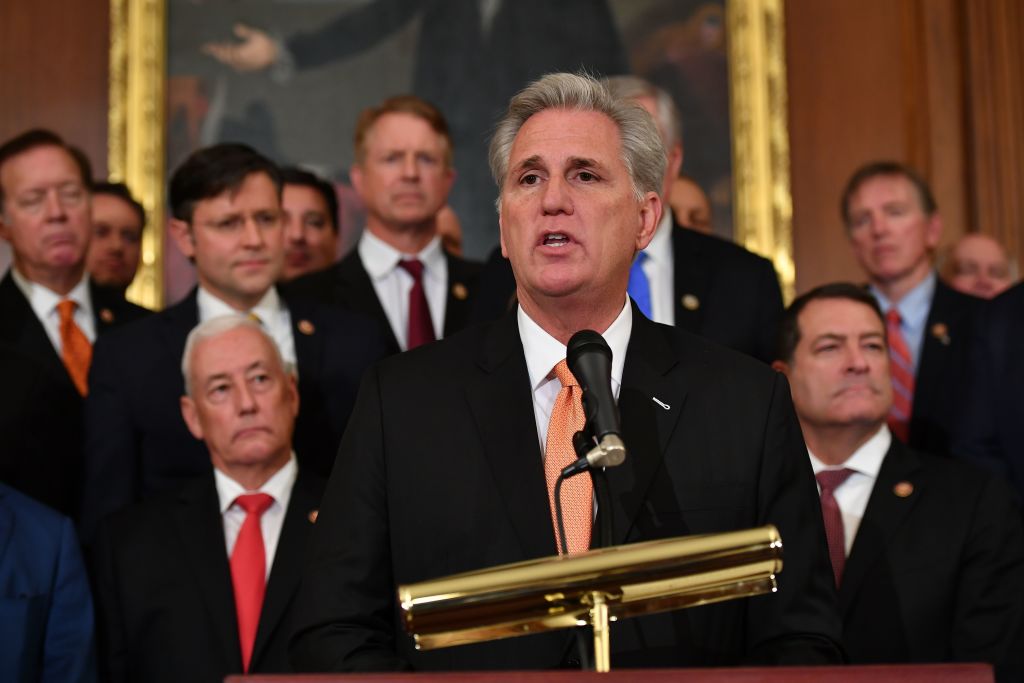Congressional Republicans are gearing up for their four millionth attempt to rein in government spending, and surely this time will be different. After years of posturing in favor of budget cuts that never seem to materialize, the national debt growing to 130 percent of GDP is finally a threshold they won’t cross. A Fox News hit? By gum, there’s no time! Republicans exclaim as they raise a quivering red pen to the latest defense authorization bill. This job is about policy, not going on TV, dammit!
You’ll forgive me if I sound a bit cynical. After all, Republicans controlled the elected government for two years under Donald Trump and the deficit only got bigger. Yet as another debt ceiling fight looms, this time the GOP sounds like they might be serious about shrinking the state. It’s certainly more promising than anything we’ve heard from Joe Biden, who offers only the usual fiscal smoke and mirrors and drop-in-the-bucket tax hikes on upper earners.
All this might come as a surprise if you’ve been paying attention to the right-of-center media lately. After Donald Trump was elected in 2016, the word went forth from a new generation of conservative thinkers that fiscal responsibility was dead. Trump had campaigned on protecting Social Security and Medicare. Paul Ryan had failed to repeal Obamacare. Rather than trying to roll the fiscal boulder up yet another hill, Republicans were told to make peace with big government and use it for their own ends. A petrie dish of this approach could be seen in Florida, where Ron DeSantis unabashedly wielded state power against Covid-hysterical localities and an activist Disney Corporation.
From a sheer chess-playing standpoint, this made some sense. It was one thing to neuter Washington during the 1980s, when it was seen as imposing liberalism on a more traditional America. But in an age when everyone from prominent CEOs to superstar academics to Blue’s Clues seems to be trafficking in left-wing identity politics, the elected government now appears as the one beachhead conservatives might hope to control. The mindset on the right has changed from one of programmatic position-taking — oppose abortion, shrink the state — to one of institutional warfare. And why would you want to downsize the one institution you have a real chance at wielding?
This argument has been au courant on the internet for years yet it’s striking how few inroads it’s made on Capitol Hill. Republicans, you just took control of the House. What are you going to do next? Cut the government! And not just cut the government, but spend a week humiliating Kevin McCarthy to make sure he signs in blood. It’s a lesson in just how little sway online conversations have in real life.
Yet it would also be unfair to say the new right critique is solely confined to Twitter. Recently the New York Times profiled Congressman Josh Brecheen, a first-term Republican from deep-red Oklahoma. Brecheen is an old-school Tea Party sort who frets about the size of government and knows his Constitution. “But as he traveled around his district,” the Times reports, “he heard little from his constituents about fiscal matters.” What he did hear about was coronavirus mandates, election integrity, the porous southern border. “So it is perhaps not surprising,” the Times concludes, “that Mr. Brecheen frames his message on spending cuts, at least in part, in the language of the aggrieved right.”
By “the aggrieved right,” the Times means “parents who would like their kids to get a decent education and not join MS-13.” Republican voters have hardly warmed to big government but they are preoccupied at the moment with “culture war” issues. So it is that Brecheen’s strategy seems to be catching on. There is no official Republican plan for how to cut spending, but among the ideas rattling around the Capitol: ending Biden’s infusion of funds to the IRS, closing government diversity offices, slashing foreign aid, cuts to the FBI budget, and stopping Obamacare’s Medicaid expansions.
Each of these initiatives has a cultural dimension that resonates with Republican voters, whether because it’s defunding a Biden or Obama overstep or sticking it to Donald Trump’s law enforcement persecutors. Think of it as a new fusionism, a marrying of culturally populist and fiscally libertarian priorities. In this, it’s bound to disappoint both true-blue budget hawks who flinch at the culture war and nationalists who want to bury libertarianism for good. But if you’re looking to force a federal haircut — and many Republicans clearly are — this may be the way to do it in the year 2023.
The problem is that it still feels like so much kabuki. For example, analyses vary as to how much the US spends on foreign aid annually, but it’s somewhere in the range of $38 billion to $60 billion. That’s a speck amid a government that blew through a cool $6.27 trillion last year. Even if you cancel all aid to Ukraine, it doesn’t make much of a dent.
In the end, close to half of all Washington spending goes to entitlement programs while another significant chunk goes to the military. Yet entitlement reforms have been taken off the table by Kevin McCarthy, a la Trump, while defense cuts are generally DOA in the GOP. This is why, despite the energy, it’s hard to see this debt ceiling fight ending much differently from the last one. Republicans rightly want to protect children from trans ideology run amok; from a future of crippling debt, less so.

























